Best Ayurvedic Herbs for Cancer Prevention
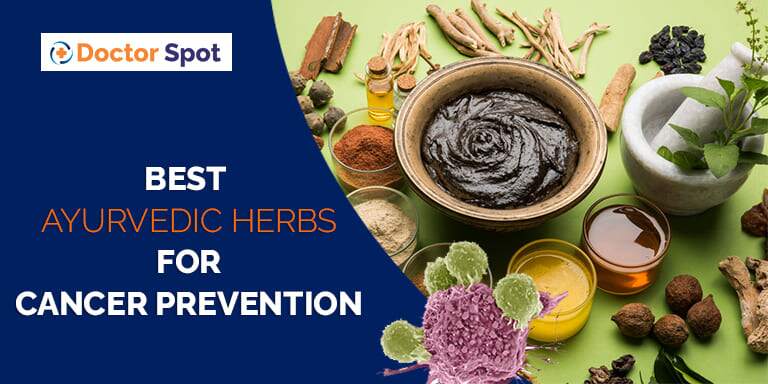
In a world where the shadow of cancer looms large, turning towards nature’s bounty for prevention can feel like a glimmer of hope. Ayurveda, an ancient healing tradition from India, holds a treasure trove of herbs that are believed to possess potent anti-cancer properties. This holistic approach to health doesn’t just focus on battling illnesses but emphasizes preventing them by maintaining a balance between the body, mind, and environment. So, let’s dive into the world of Ayurvedic herbs that have been revered for centuries for their cancer-preventive potential.
Understanding Ayurveda and Its Philosophy on Cancer
Ayurveda views cancer as a result of lifestyle and genetic factors leading to an imbalance in the body’s three doshas (Vata, Pitta, Kapha). The practice promotes the use of herbs, diet, and lifestyle changes to rejuvenate the body and prevent diseases.
Key Concepts:
- Doshas: The three energy forces governing physiological activity.
- Agni: The digestive fire, crucial for converting food into energy.
- Ama: Toxic by-products of improper digestion, leading to disease.
The Mighty Herbs: Ayurveda’s Arsenal Against Cancer
Let’s explore the most potent Ayurvedic herbs known for their cancer-fighting abilities:
Turmeric (Curcuma Longa)
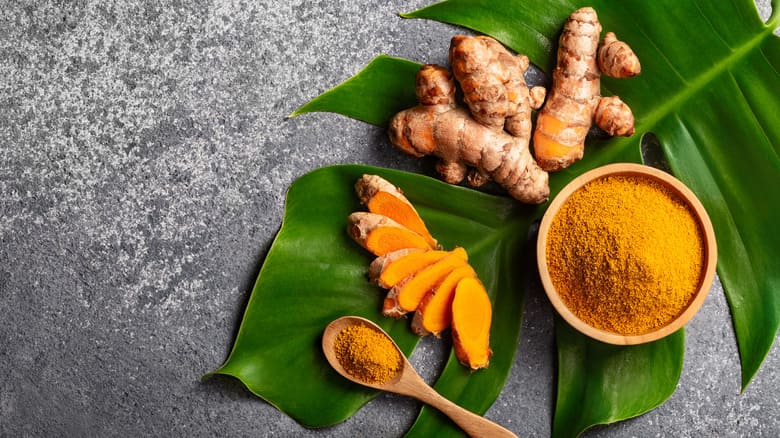
Turmeric (Curcuma longa) is highly regarded for its cancer-preventive properties, largely attributed to its active compound, curcumin. Curcumin exhibits strong anti-inflammatory and antioxidant effects, which help protect cells from damage and prevent the initiation and progression of cancer. It has been shown to inhibit the growth of various types of cancer cells and induce apoptosis, or programmed cell death, in malignant cells. Curcumin also interferes with multiple cellular signaling pathways involved in cancer development. Additionally, it enhances the efficacy of certain chemotherapy drugs and reduces their side effects. Regular consumption of turmeric, through diet or supplements, may contribute to reduced cancer risk and improved overall health.
- Benefits: Reduces inflammation, inhibits tumor growth, and enhances the efficacy of chemotherapy and radiation.
Holy Basil (Ocimum sanctum)
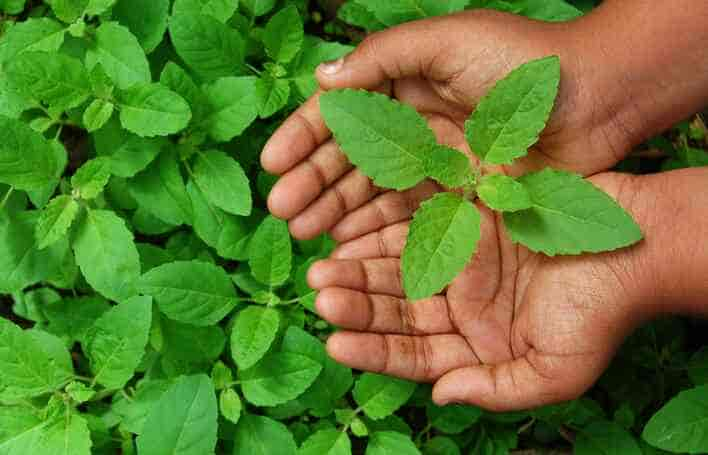
Holy Basil (Tulsi, Ocimum sanctum) is valued for its potent anticancer properties. It contains phytochemicals like eugenol and ursolic acid, which help inhibit cancer cell growth and induce apoptosis. Tulsi’s strong antioxidant properties protect cells from oxidative stress and DNA damage, reducing cancer risk. Its anti-inflammatory effects also help lower chronic inflammation, a known factor in cancer development. Regular consumption of Tulsi, through tea or supplements, may contribute to cancer prevention and overall health.
- Benefits: Potent anti-cancer, anti-inflammatory, and antioxidant properties. It also helps in modulating the immune system.
Ashwagandha (Withania somnifera)
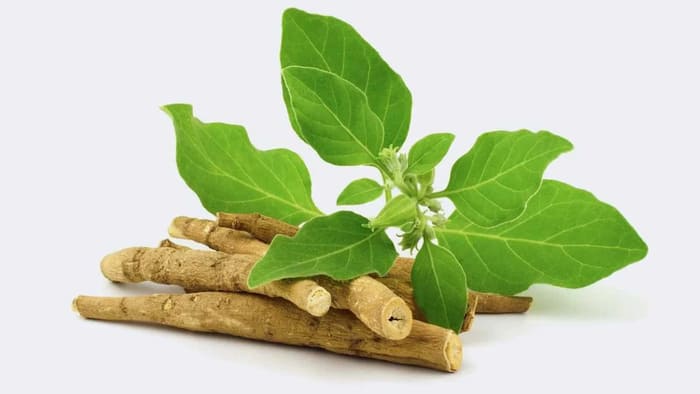
Ashwagandha (Withania somnifera) is a potent adaptogenic herb known for its cancer-preventive properties. It contains withanolides, which have been shown to inhibit the growth of cancer cells and induce apoptosis, or programmed cell death. Ashwagandha also boosts the immune system, enhancing the body’s natural defenses against cancer. Its anti-inflammatory and antioxidant properties further protect cells from damage and reduce the risk of cancer development. Additionally, ashwagandha helps alleviate stress, which can contribute to overall well-being and potentially lower cancer risk. Regular use of ashwagandha, through supplements or herbal preparations, may support cancer prevention and promote overall health.
- Benefits: Enhances the body’s defense against disease, reduces tumor growth, and counteracts the effects of stress.
Amla (Emblica Officinalis)
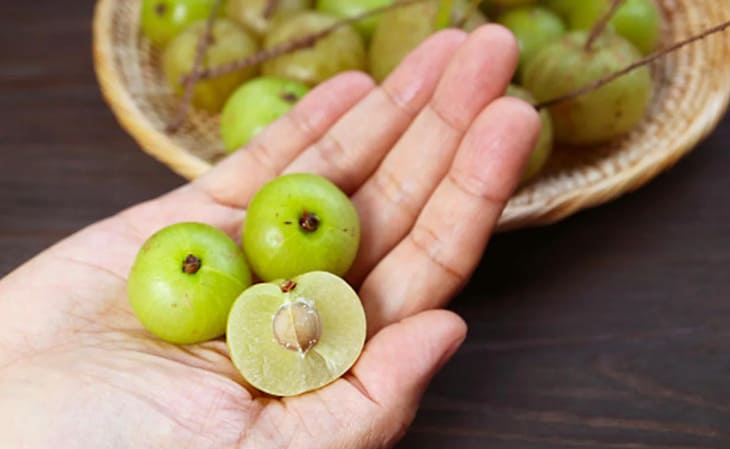
Amla, or Indian gooseberry, is highly valued in Ayurveda for its potent antioxidant properties, primarily due to its high vitamin C content. It helps neutralize free radicals, which can damage cells and lead to cancer. Amla also boosts the immune system, enhancing the body’s ability to fight off harmful pathogens and abnormal cell growth. Its anti-inflammatory properties further aid in reducing cancer risk. Regular consumption of amla is believed to support overall health and potentially lower the incidence of cancer.
- Benefits: Strengthens the immune system, inhibits the growth of cancerous cells, and detoxifies the body.
Neem (Azadirachta Indica)
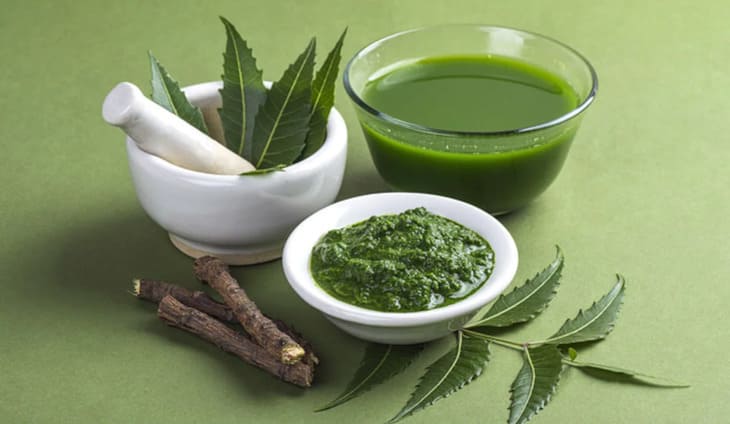
Neem (Azadirachta indica) is renowned in Ayurveda for its numerous medicinal properties, including its potential in cancer prevention. Neem leaves, bark, and oil contain compounds such as nimbolide, quercetin, and azadirachtin, which have demonstrated anticancer properties in various studies. These compounds help in inducing apoptosis (programmed cell death) in cancer cells, preventing their proliferation. Neem also possesses strong antioxidant properties, which protect cells from oxidative stress and DNA damage, both of which can lead to cancer.
Additionally, neem’s anti-inflammatory properties help reduce chronic inflammation, a known risk factor for cancer development. Its ability to modulate the immune system further supports the body’s natural defenses against cancerous growths. Neem extracts have been shown to inhibit the growth of tumors and enhance the effectiveness of conventional cancer treatments. Regular use of neem, through supplements or topical applications, may contribute to overall health and reduce the risk of cancer. However, more clinical studies are needed to fully understand its efficacy and potential in cancer prevention.
- Benefits: Anti-cancer, anti-inflammatory, and antioxidant properties. It also enhances liver function, crucial for detoxifying the body.
Integrating Ayurvedic Herbs into Your Daily Routine
Incorporating these herbs into your diet or daily routine can be a powerful step in cancer prevention. However, it’s essential to consult with a healthcare provider or an Ayurvedic practitioner to ensure they’re suitable for your individual health needs.
The Holistic Approach: More Than Just Herbs
Ayurveda emphasizes a holistic approach to prevention, including diet, lifestyle, and mindfulness practices. Engaging in regular physical activity, consuming a balanced diet rich in fruits and vegetables, and managing stress through yoga and meditation can amplify the benefits of these herbs.
Conclusion: Embracing Ayurveda’s Wisdom for Cancer Prevention
The journey to preventing cancer is multifaceted, and Ayurveda offers a wealth of knowledge and natural resources to support this quest. By incorporating Ayurvedic herbs into a comprehensive approach emphasizing diet, lifestyle, and mindfulness, we can harness nature’s power to not only prevent but thrive in the face of challenges like cancer. Remember, the path to wellness is personal, and what works for one may not work for all. Consulting with healthcare professionals and Ayurvedic practitioners can provide guidance tailored to your individual needs, paving the way for a balanced, healthy life.
“Ayurveda teaches us to cherish our innate-nature – to love and honor who we are, not as what people think or tell us, who we should be.” – Prana Gogia
Embrace Ayurveda’s wisdom and embark on a journey to holistic health and cancer prevention. Nature has provided us with a pharmacy of extraordinary herbs; it’s time we leverage their potential to lead a disease-free life.
FAQs